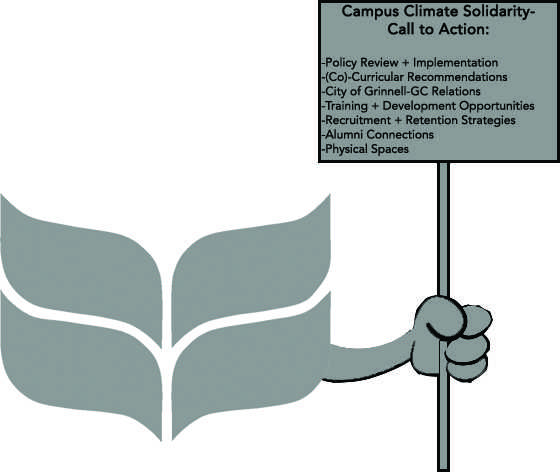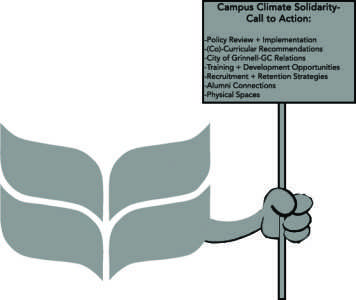Michael Cummings, Staff Writer
cummings@grinnell.edu
Anyone following the national news should be well aware of the recent events at the University of Missouri and other college campuses across the country. Students have stood up against racial discrimination and asked—in some cases, demanded—that their college’s administration do something about it.
This wave of protests has impacted colleges as distant as Occidental College in Los Angeles and Yale University in Connecticut, but it has also made its mark right here at Grinnell. On Friday, Nov. 20, President Raynard Kington sent out a special campus memo informing the Grinnell community of an action plan put together by students and faculty to combat racism on campus.
The call to action, posted to the College’s website, references these recent events at other campuses and seeks to use this time as “an opportunity to be proactive about the campus climate at Grinnell College.”
The action plan was put together in large part by Anita DeWitt ’17, SGA Diversity and Outreach Coordinator, along with SGA Vice President for Student Affairs Dixon Romeo ’16, Director of Intercultural Affairs Leslie Turner ’07 and Chief Diversity Officer Lakesia Johnson.
DeWitt pointed out that many other students and organizations such as Concerned Black Students (CBS) and the African Caribbean Student Union (ACSU) also gave input as to what should be included in the plan.
“I just wanted to get a lot of feedback on what a lot of students think,” DeWitt said. “When I sit down and think about the institutional changes that should happen, I [can] only come up with so many things.”
The plan included “relatively cheap institutional things the College can do to help, not only support, different minoritized students, but also to create a culture where we challenge these views that some people have,” Romeo said.
President Kington, to whom the action plan was originally sent, says the proposals are currently under consideration. The plan is being reviewed by the Diversity and Inclusion Council, who will recommend to Kington what proposals should be implemented and how they should be implemented.
“But we won’t restrict ourselves just to those recommendations,” Kington said.
“… Professor [Lakesia] Johnson … has already started planning programs to help faculty understand implicit bias and how it might manifest itself in the classroom, and what they might do to minimize it, to be aware of it, and to minimize the impact.”
He added that the College has also recently implemented a new policy that will provide added diversity to the process of recruiting new faculty members.
“I’m going to ask that the [Diversity and Inclusion Council] get back to me probably by the end of January with recommendations about and priorities about how we might implement the recommendations that we think are reasonable to implement,” Kington said. “I’m not saying any of them are unreasonable. Actually, I think overall it was a pretty thoughtful plan. I was impressed that there was a great deal of thought that went into that.”
While this movement has been fueled by protests at other colleges, the drafters of this plan saw more local reasons why action needed to be taken.
“It was recent events across the country, but it was also just our own events. Yik Yak happened, that was a thing,” Dewitt said, speaking about the racist comments that were posted on the anonymous app Yik Yak last semester.
Romeo agreed.
“It’s heavily informed by recent events on other campuses, but I also think that it’s been informed by stuff that’s happened here on our campus,” he said. “You don’t have to read a book or watch the news to see it happening, you can open your window.”
DeWitt felt that action needed to be taken because she wants the College to assume a more active role in dealing with these problems.
“You don’t want it to be in the hands of other students after [you] leave, that’s what I’m thinking. I need the administration to be always taking charge of this kind of thing,” she said.
Kington expressed his approval of one key difference between Grinnell’s call to action and some similar movements at other colleges.
“I think ours was notably driven by a desire to work with the College to address a problem,” Kington said. “Even the wording, it was a proposed plan, not a demand.”
It is also notable because students were not the only ones providing input to the plan.
“This wasn’t just CBS or other cultural groups, this was faculty, this was staff, this was students at large, people who just decided [to contribute to the plan] and as a group created it,” Romeo said.
Romeo was pleased with the cooperation between students and the administration on this issue.
“I think they’ve been very cooperative. At least with this issue, in my opinion, it’s not a student versus administration thing where we came to them and they were like, ‘No, no, no, no, no.’ … This was like, ‘Yeah, we know. Tell us what you all ned,’” Romeo said.
On the other hand, DeWitt was not as pleased with the administration’s response.
“Sometimes I do think they’re doing the best that they can. … I just think it’s something that’s really hard, that they have no idea what they’re doing,” DeWitt said.
While the proposed policy changes will go a long way, Kington expressed doubt that they could end racism.
“The roots of the problems of racism and different experiences can be drawn all the way back to the founding of this country, so the idea that we’re going to be able to reverse implicit bias immediately—and this was not the expectation of students—the idea that we acting alone can fix everything is just not realistic,” he said.
However, he did express optimism that the Grinnell community was taking steps in the right direction.
“Change will never occur unless we start demanding that change will occur,” Kington concluded.




































































Details? • Dec 4, 2015 at 12:11 pm
Why are there no details of the proposed plan presented in the article? Is the draft plan somehow a secret? Honestly, I’m just curious as to what Prof. Johnson and others are proposing…
This news article is shoddy.